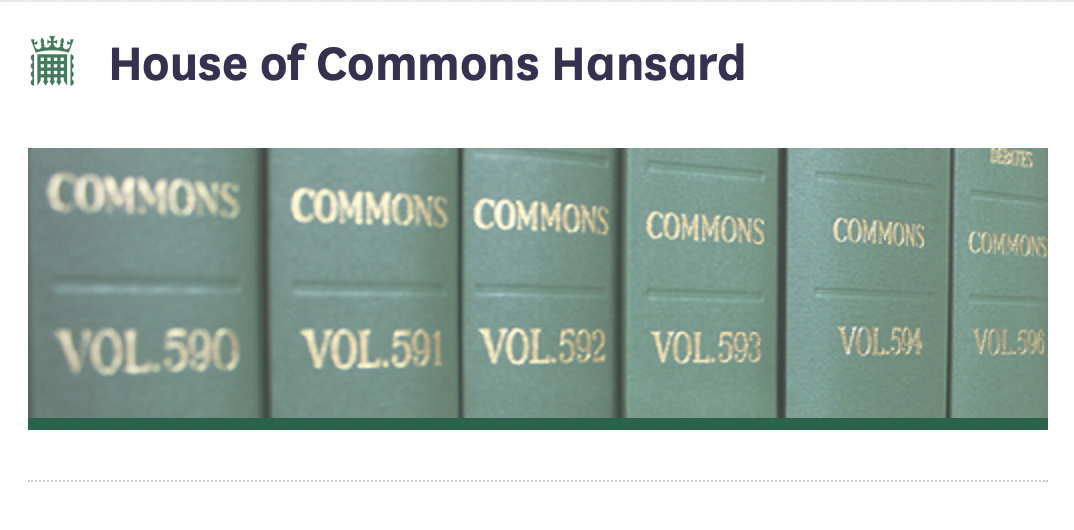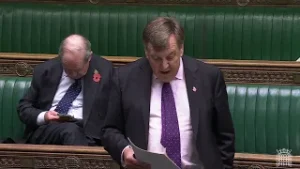Anum Qaisar-Javed
(Airdrie and Shotts) (SNP)
What recent discussions his Department has had with relevant stakeholders on the future of Channel 4.
Mr Tanmanjeet Singh Dhesi
(Slough) (Lab)
What plans the Government have to privatise Channel 4. (902114)
Navendu Mishra
(Stockport) (Lab)
What plans the Government have to privatise Channel 4. (902117)
The Minister for Media and Data
(Mr John Whittingdale)
As part of our ongoing strategic review of the UK’s system of public service broadcasting, the Government are consulting this summer on the future of Channel 4, including its ownership model and remit, and we intend to engage a broad range of stakeholders to inform any decisions taken.
Anum Qaisar-Javed [V]
As part of its public service broadcaster responsibilities, Channel 4 does not have an in-house production function, relying on independent external production houses. Former Channel 4 commissioning editor Peter Grimsdale said that over 1,000 such production companies have been supported over the years. How do the Government mean to support those production houses if they sell off Channel 4, or do the thousands of jobs that would be destroyed in the sector not matter to this Tory Government?
Mr Whittingdale
The hon. Lady is right that Channel 4 does not have an in-house production company, which means that it is entirely dependent on advertising revenue, which is one of the reasons why we think it right to look at the ownership model, but it does support independent production right across the United Kingdom. That is part of its remit and we intend to preserve the remit, although we will be examining whether that needs to be changed—indeed, possibly strengthened in some areas—as part of our consultation.
Mr Dhesi
Channel 4 is a great British success story and an iconic institution. It has invested £12 billion in the independent production sector and regional TV, given voice to local communities across our country, and exported content around the world; and it has recorded a record £74 million financial surplus. Despite all those successes, for the sixth time, the Conservative Government are seeking to privatise it, even though they concluded just four years ago that that was a very bad idea. Could that possibly be because “Channel 4 News” is doing a solid job, in particular, of holding an incompetent and crony-connected Government to account?
Mr Whittingdale
I share the hon. Gentleman’s view that Channel 4, which was, of course, the creation of a Conservative Government, has done an excellent job and it is our intention to sustain it into the future. That is why we believe that now is the right time to look at its future ownership, because it is coming under increasing pressure due to the changes taking place in the way in which television is consumed. While I may not always agree with “Channel 4 News”, I do believe it does a good job. I very strongly support plurality of news providers and would expect that Channel 4 will continue to feature a news service as part of its future offering, and that would remain part of its remit.
Navendu Mishra
John McVay, the chief executive of the Producers Alliance for Cinema and Television, has described Channel 4 as “a catalyst for generations of entrepreneurs”, which “plays a critical role in the UK’s broadcasting ecology”, having “invested in hundreds of independent production companies over the nearly 40 years of its existence, enabling and improving access, skills, international activity and diversity.”
Would the Minister agree with me that selling off this precious public asset to an overseas competitor with no remit for commissioning innovative British content would be a body blow to the UK’s creative economy?
Mr Whittingdale
I agree that selling off Channel 4 with no remit would be a mistake and that is certainly not our intention. John McVay, who is somebody I know well and have a great deal of respect for, is right that Channel 4 has done an excellent job in investing in independent production, but it is up against competition from big streaming services that can make 10 times the kind of investment that Channel 4 is capable of. That is why we think it is the right time to look at its ownership in order that, potentially, it can have access to much greater capital, which it will need in order to have a thriving future.
Julian Knight
(Solihull) (Con) [V]
My own personal view, and I stress that it is my personal view, is that the recovery of Channel 4 and the evolving media landscape warrant close consideration of privatisation and sale. Four years is a lifetime in the modern media marketplace. Does the Minister agree that this would be a good juncture at which also to consider whether Channel 4 could be bolstered by a merger with ITV or even by hiving off BBC Worldwide, the commercial arm of the BBC, which has often underperformed but has tremendous international potential to build scale for Channel 4?
Mr Whittingdale
I am grateful to my hon. Friend, and I commend him and his Select Committee for the excellent report on public service broadcasting that they produced recently, which drew attention to the fact that the way in which we consume television is changing fast and that the switch from linear to digital is taking place even more quickly than some people anticipated. We have reached no conclusion as to the appropriate future ownership model for Channel 4—we maintain a completely open mind—but he raises a number of interesting possibilities and we look forward to seeing what submissions we receive as part of the consultation.
John Nicolson
(Ochil and South Perthshire) (SNP) [V]
The case for the privatisation of Channel 4 was, of course, debunked by the then Secretary of State last time the issue reared its head. I think her assessment was that it would be too much grief for too little money. Privatisation would see profit put first, a slash in the £500 million that goes annually to independent production companies, a centralisation of headquarters—the antithesis of levelling up—and likely cuts to Channel 4’s brilliant news and current affairs programming. Channel 4 recorded record profits last year and it does not cost the taxpayer a penny. Given that this much-loved institution is profitable and free, why do Ministers want to do down Britain and sell it off to avaricious American investors?
Mr Whittingdale
The hon. Gentleman is wrong on several counts. It is the case that Channel 4 recorded a profit last year, and I commend the management for taking the action that made that possible, but the reason they did so was because they cut the amount of money that they spent on content by £140 million in anticipation of a big fall in advertising revenue, which indeed took place. It is to sustain Channel 4 going forward that we are looking at the possibility of alternative ownership models, and it would certainly be our intention that Channel 4 would do more outside London and across the United Kingdom, not less.
Christian Matheson
(City of Chester) (Lab)
“Countdown”, “Derry Girls”, “Gogglebox”, “The Word”, “It’s a Sin”, “Chewing Gum”—which gave us the astonishing Michaela Coel for the first time—“Educating Yorkshire”, “24 hours in A&E”, “24 hours in Police Custody”, “Location, Location, Location” with Phil and Kirstie, “Friday Night Dinner”—
Christian Matheson
I will simply finish with “Hollyoaks” and “The Secret Life of the Zoo”, Mr Speaker, which as you know have something in common with me—[Laughter.] They were both filmed in Chester. For four decades, Channel 4 has reflected and given voice to the diverse parts of the United Kingdom. Why do the Minister and the Government want to take that voice away and, as other hon. Members have said, sell it off to foreign tech companies that have no loyalty to the United Kingdom?
Mr Whittingdale
I am extremely impressed by the hon. Gentleman’s viewing habits, although I notice he left out “Naked Attraction”, which certainly does appeal to diverse tastes. However, I absolutely agree that Channel 4 has been responsible for some great programmes over the years, and it is our intention that it should be able to continue to do that in the coming years. It is precisely because it is going to need access to investment capital in order to maintain that record that we think now is the right time to consider alternative models, but we have not reached any conclusion yet.

